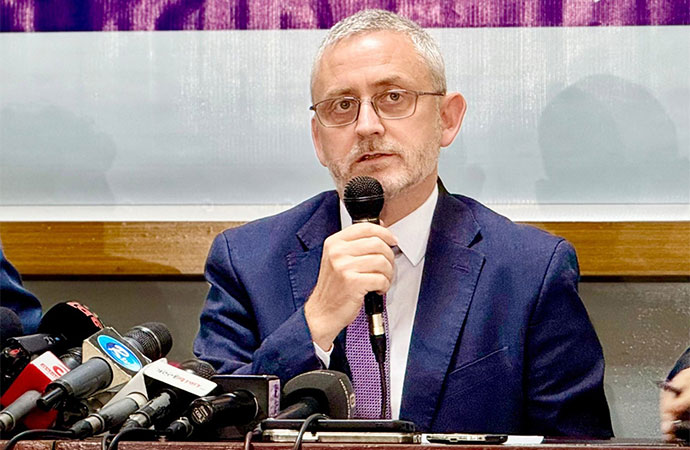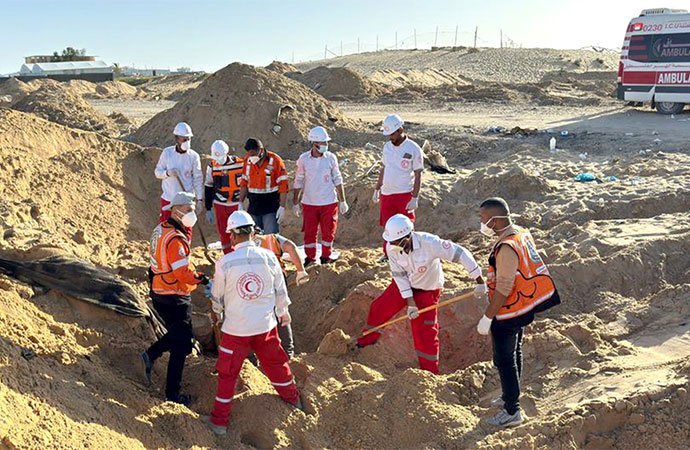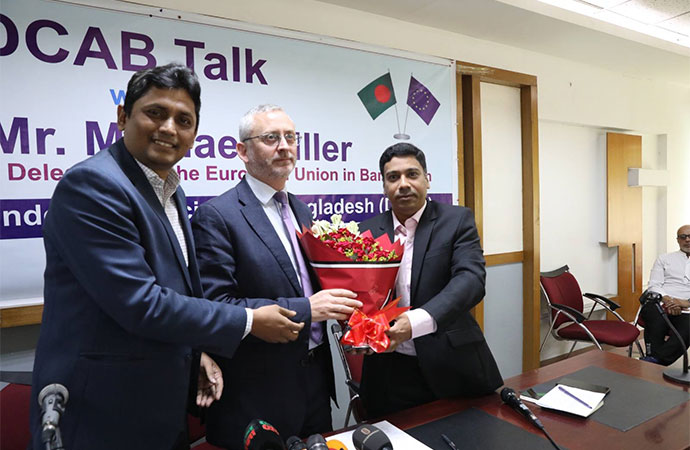Reportage

Michael Miller, Ambassador and Head of Delegation of European Union in Bangladesh
Women’s Affairs Commission’s proposals should be looked at “extremely carefully, closely”
Reiterating its support for the delivery of an ambitious reform agenda in Bangladesh, Ambassador and Head of Delegation of the European Union Michael Miller on Monday said the election timing is an issue for Bangladesh to decide and they are not pressuring on anyone to hold the election on a particular date.
"I think that I have to say that timing is a matter for Bangladesh to take a decision upon. We see this political transition as leading up to democratic elections. So, that's the important milestone I mentioned. But as the European Union, we don't have an opinion about time, and we are not pressuring anyone to hold elections on a particular date," he said while responding to a question at the "DCAB Talk" held at Jatiya Press Club.
Diplomatic Correspondents Association, Bangladesh (DCAB) hosted the event where DCAB President AKM Moinuddin and General Secretary Md Arifuzzaman Mamun also spoke.
Ambassador Miller said they are waiting for political parties and the interim government to agree on "very clearly prioritised and specific list of reforms" and noted that they do have experience which is helpful and financing which can support. And we have the political will to stand with you."
Chief Adviser Prof Muhammad Yunus has recently said the people of Bangladesh think that the interim government is still the "good answer" for them but stressed that they will not go beyond June 2026 to hold the best election ever in the country.
Prof Yunus, who is also Chairman of the National Consensus Commission, stressed the urgency of accelerating reform efforts to ensure that the national election is held between December this year and June 2026.
Ambassador Miller said they think that there needs to be sufficient time to implement the reforms under this interim government.
Referring to their work with the Election Commission, he said they have been engaging to try to identify where the European Union can be most helpful in supporting the conduct of the elections in line with international standards.
"We absolutely want the elections, when they are held, to be ones that we can look at and say, this is free and fair and the result is entirely credible," said Ambassador Miller, adding that they we want to be part of that success story, because it will be a very significant milestone in Bangladesh's political transition.
He said they are also working to make sure that disinformation is not something that they see undermining the free and fair conduct of the elections when they happen.
Based on deaths reported by various credible sources, the UN report estimated that as many as 1,400 people may have been killed between 1 July and 15 August, and thousands were injured, the vast majority of whom were shot by Bangladesh's security forces.
Responding to a question, the EU Ambassador said they support the work of the UN fact-finding mission and laid emphasis on accountability for those "terrible crimes" perpetrated against the people during the July Uprising.
Highlighting the importance of Bangladesh's judicial authorities' evidence-based work, Ambassador Miller hoped that Bangladesh will deal with the terrible crimes perpetrated against its people.
"There must be accountability. There must be transparent and fair process and the rights of every single person should be respected through due process," he added.
Ambassador Miller said the interim government had inherited "very great number of challenges", including on security, economy, financial fronts and rebuilding confidence takes time.
Talking about women's rights, the EU envoy said equality between men and women is the core value in Europe and it is a core universal value.
He said the work of the Women's Affairs Reform Commission should be examined extremely carefully and they support all efforts that ensure equality between men and women.
"The report and the recommendations of the Women's Affairs Reform Commission are extremely important. We consider equality between men and women as core value of the EU," said Ambassador Miller.
He said the recommendations of the Commission should be looked at "extremely carefully and closely" by political parties because they would like to see those recommendations translated into actions. "We will contribute towards greater equality."
In response to a question on the Rohingya issue, Ambassador Miller said unfortunately this is a crisis that goes on despite the best efforts of Bangladesh and partners like the European Union.
"There are enormous efforts being made by Bangladesh," he said, adding that there is violence on the other side of the border.
"We are indeed trying very hard to support a political solution which is the only solution to this crisis," said Ambassador Miller.
"I have to say, we have many conversations with the Bangladesh authorities, those conversations always concluded with a common understanding that return can only be in a safe, dignified, and voluntary manner," he added.
As a humanitarian partner for Bangladesh, Ambassador Miller said they are quite happy to be pragmatic on how they can meet the needs of the refugees.
The European Union has maintained a consistent level of support over the past seven years. In 2025, the European Union has already allocated over EUR 32 million to support the Rohingya refugees and their Bangladeshi host communities. These funds are provided via the Joint Response Plan, which we are launching today.
The European Union also supports Rohingya refugees who have fled to other countries in the region, as well as the Rohingya who remain in Myanmar. Our total support for the Rohingya since 2017 equals nearly 1 billion EUR provided together by the EU and its Member States.
Prosperity, Stability
Ambassador Miller said they need to deepen and widen the partnership with Bangladesh and for them the relationship is a strategic choice with respect for fundamental rights and the creation of economic opportunity.
"And in saying this, I spoke about the fact that your prosperity is our prosperity, but your stability is also our stability. This is a highly interconnected world in which we live. So it's a partnership we are building," he said.
Ambassador Miller said they are far and above partnering with countries which are in the process of developing because they believe that "your prosperity is our prosperity, too."
Noting that the world is an unstable place, the Ambassador said they are in the business of looking for partners everywhere, including in Bangladesh, for sharing the leadership on issues including on climate change.
"I find this presents a moment of opportunity for the European Union to deepen and widen its partnership with Bangladesh," he said.
"We look to our partners, including here in Dhaka, to speak up vocally alongside us in defense of rules that protect us all. We are still building bridges with those who like us care about fair and rules-based trade as the basis for the creation of wealth and jobs for our citizens," he mentioned.
Sitting here as an observer eight months into his job, the Ambassador said Bangladesh's political transition is a unique opportunity for the country to underpin respect for fundamental rights in Bangladesh to restore democracy and to let civil society breathe. "And in civil society, I include the media, of course."
The Ambassador said they are working on port safety with Bangladesh and on maritime security as well. "But given the level of insecurity in this world, we want to also see military to military cooperation between the EU military staff and the military here in Bangladesh."
He said they are working also on countering terrorism and countering violent extremism across the region, and that is equally an important area for them to continue to cooperate upon.
On migration issues, he said they support safe, dignified and regular migration but unfortunately, migration can be irregular, undignified and extremely dangerous.
"We prefer to look for legal pathways for migration, even if this is on a small scale, because what happens currently, regrettably, is that poor migrants try to reach Europe with a dream of prosperity, which we can all understand. But they are, in fact, exploited by traffickers and smugglers along the way, and they even lose their lives," he said.
And this is something that they need to put order into, said the Ambassador, adding that it is a shared interest.
"I think, between the EU and Bangladesh, informing migrants about the risks or about the opportunities, is something that is extremely important to us," he said.
Ambassador Miller said they will continue to work towards ensuring a smooth graduation from LDC status for Bangladesh.
"You need a more complex value chain, in our view where you are building wealth for your citizens who are very talented individuals. We are, in return, expecting a level playing field for our trade and our investment," he said, adding that Bangladesh needs to open up its economy in sectors where the private sector can bring world class technology.
The Ambassador said they do want to see greater trade and investment between the EU and Bangladesh going in those directions.
Cross-border assistance
Highlighting the needs of the Rohingya refugees, Ambassador Miller on Monday said cross-border "assistance" can only work when individuals are safe on both sides of the border and when governments agree.
"We have done cross-border assistance in other parts of the world, and it can work, but it can only work when individuals are safe on both sides of the border and when governments agree," he said while responding to a question on the definition of a corridor versus the definition of a passage.
And those are the conditions, Ambassador Miller said, adding, "You cannot have a situation in which you try to work in this cross border way, but it merely attracts attention from violent perpetrators of crimes. So, these are the caveats that I would want to see in place now."
On the definition of a corridor versus the definition of a passage, Ambassador Miller, however, said he is unable to give an inside information but as a humanitarian partner for Bangladesh, they are quite happy to be pragmatic about how they can meet the needs of the refugees.
"If the refugees are here, we will meet their needs here, if they are on the other side of the border, because the situation might one day improve. We will also look at how we can channel assistance to them there, because it can be cross border," he mentioned.
The Ambassador recognised that there is an enormous effort being made by Bangladesh hosting so many refugees from violence across the border.
"And we also recognise that there are even new arrivals to this day, which illustrates that the violence continues and that Rohingya living in the Rakhine state still feel insecure," he said.
So, unfortunately, Miller said, this is a crisis that goes on and on despite the best efforts of Bangladesh and of partners like the European Union, where they are indeed trying very hard to support a political solution, which is the only solution to this crisis.
He said the European Union imposed sanctions on members of the military regime and on those they consider to be perpetrating acts of unbelievable violence and cruelty on their own population on the other side of the border.
"But allow me to speak a bit beyond the political wish; we have to see a solution. So in very practical terms, we are standing alongside your authorities in helping you cope with the refugee presence in Cox's Bazar," said Ambassador Miller.
He said they have contributed over half a billion euros in humanitarian assistance since this wave of refugees started to come to Bangladesh.
"We have many conversations with the Bangladeshi authorities. Those conversations always conclude with a common understanding that return can only be safe, dignified and voluntary. We all know that the refugees should go back one day," he said, adding that they cannot go back in circumstances where their lives are at risk.
The European Union has maintained a consistent level of support over the past seven years.
In 2025, the European Union has already allocated over EUR 32 million to support the Rohingya refugees and their Bangladeshi host communities.
These funds are provided via the Joint Response Plan.
The European Union also supports Rohingya refugees who have fled to other countries in the region, as well as the Rohingya who remain in Myanmar. Our total support for the Rohingya since 2017 equals nearly 1 billion EUR provided together by the EU and its Member States.

























Leave a Comment
Recent Posts
Auspicious beginnings, but a l ...
The newly elected government of Bangladesh is now in office, and the e ...
Caught between tigers and pira ...
Over 10,000 fishermen in the Sundarbans have suspended their fishing a ...
Historic Chawk Bazar comes alive with iftar items on ..
Shaping Young Conservationists: School Conservation ..
Iran has said it has reached an understanding with t ..
New Finance Minister Amir Khosru Mahmud Chowdhury